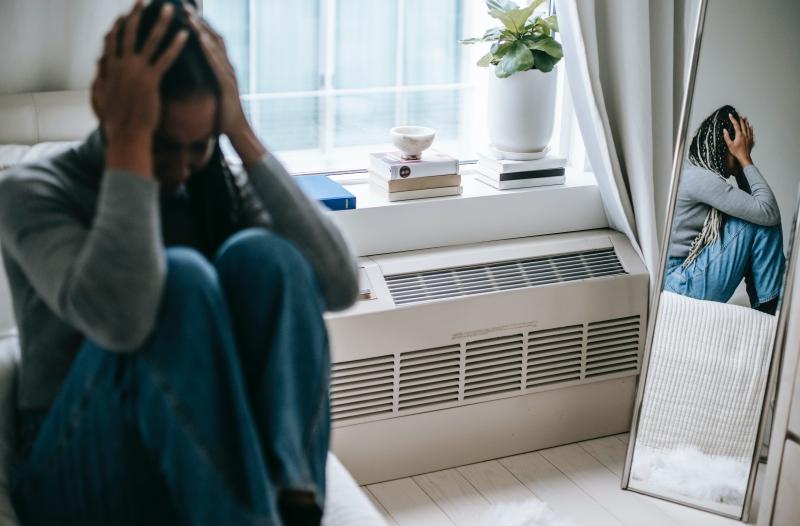Anxiety disorder
If your anxiety is no longer in proportion to the cause of your fear and starts having a significant impact on your daily life, you might be suffering from an anxiety disorder.
When I have to speak up in class, I can feel my heart banging in my chest and I can barely hear my own voice.

Did you know this?
Anxiety disorders are among the most common psychological disorders. An anxiety disorder often first manifests itself between the ages of 15 and 30, and is twice as common among females than among males. Approximately 25% of all students are faced with anxiety and stress. 8% of students in higher education have an anxiety disorder, and about half of them even suffer from more than one. Anxiety is often also accompanied by depression.
How stress and anxiety can actually be helpful
Everyone feels stressed and anxious once in a while. Both stress and anxiety are basic emotions that can be highly useful to help us react to difficult and threatening situations quickly and effectively.
When you come across a threat, your built-in stress response system is activated and multiple hormonal reactions enable you to shift into a state of alertness and respond appropriately.
This is particularly useful when you’re studying. If, for example, you suffer from fear of failure, this fear can enhance a stress reaction in your body that stimulates you to do your very best and study harder. In other words, it makes you more alert and temporarily boosts your performance.
When anxiety takes over
Sometimes, however, stress and anxiety shoot past their target. When your anxiety is no longer in proportion to its cause and this persists for a longer period of time (i.e., several months), it becomes problematic. The anxiety can become so debilitating that you start to avoid certain things or situations.
This can have a serious impact on your life. You often get caught up in a vicious cycle, i.e., you start to avoid things more and more, which makes you increasingly anxious.

When your ‘fear of fear’ increases significantly, you may be dealing with an anxiety disorder.
Anxiety problems and disorders can take on many forms. These include:
- fear of failure
- panic disorder: panic attacks with hyperventilation and fear of the attacks themselves
- generalised anxiety disorder: generally being afraid of everything, often accompanied by intense worrying
- social anxiety disorder: the fear of feeling inadequate in social situations
- post-traumatic stress disorder: reliving a tragic event
- specific phobia: a particular fear of certain animals, blood, confined spaces, etc.
- separation anxiety: the fear of being abandoned by loved ones
- obsessive-compulsive disorder: developing obsessive thoughts and compulsive behaviours to undermine the fear
All these types of anxiety are different, yet they have many things in common. Typically, different forms of anxiety occur at the same time.
Anxiety disorders are characterised by physical symptoms such as restlessness, shaking, sweating, dizziness, abdominal pain or headaches, insomnia, fainting, nausea or other physical issues.
Anxiety also has a big impact on your thoughts, feelings and concentration. For example, when you are anxious, your concentration levels can decrease drastically, making way for negative thoughts and worrying.

Stress and anxiety also have an impact on your relationships. During periods of excessive stress and fear, you may feel an intense need to be surrounded by others, and for them to be close. Conversely, you may prefer to be on your own, withdraw and avoid social contact as much as possible.
The impact of an anxiety disorder can be so intense that it triggers dreariness, which, in turn, can develop into depression. In that sense, anxiety and depression often go hand in hand. The reverse is also true: people suffering from severe depression can become anxious due to the experiences that depressive disorders bring about.
Talking about your fears can provide relief and support.
Talk about it
Are you feeling stressed and anxious, and are you worried about it? An important first step in coping is to talk about it. This can be a relief and help you get things straight.
Talk to somebody you trust and feel good around, preferably someone you know, like a good friend, your parents or siblings.
If you struggle to talk to someone in your close surroundings, try to approach a person who is familiar with similar experiences, such as a GP or a student advisor at your college or university.
Would you prefer to share your story anonymously? You can always call on Awel (102 or awel.be) or Tele-Onthaal (106 or tele-onthaal.be). For questions about suicide, call the Suicide Hotline (1813 or zelfmoord1813.be)
Keep your anxiety under control
The online self-help programme Stress and Anxiety consists of 6 sessions that help you control your stress and anxiety.
Seek help
Anxiety symptoms usually do not disappear by themselves. They can also re-appear after a while. So definitely seek help.
Anxiety disorders can be treated quite well. Psychotherapy has proven to be effective as you learn to understand your own physical reactions to anxiety triggers and to work on your avoidance behaviour. This helps you tackle and break the vicious cycle of anxiety.
Mindfulness, worry training and relaxation therapy can also help you move away from your anxiety patterns. In some cases, medication (tranquilisers and/or antidepressants) can be helpful, too. Speak to a health professional to find out the different options for your particular situation.
Feared and conquered: students & expert sharing their experiences
Anxiety, stress and depression. Sooner or later, many students will have to deal with these issues to some extent. In this episode, our host addresses this topic together with her guests, Birthe and professor Patrick Luyten (KU Leuven & University College London), who is specialized in mood disorders.
Worried about someone?
Have you noticed a friend dealing with anxiety and stress, and are you worried about them? Talk about it and share your concerns. Try to be understanding and listen to their story without judging them.
Keen to learn, read or hear more about this topic?
Podcasts
Self-help
TED Talks
Powerful stories
You are not alone. Get inspired by other students' stories about vulnerability and doubt. But above all about the power of connectedness.
Go to the stories